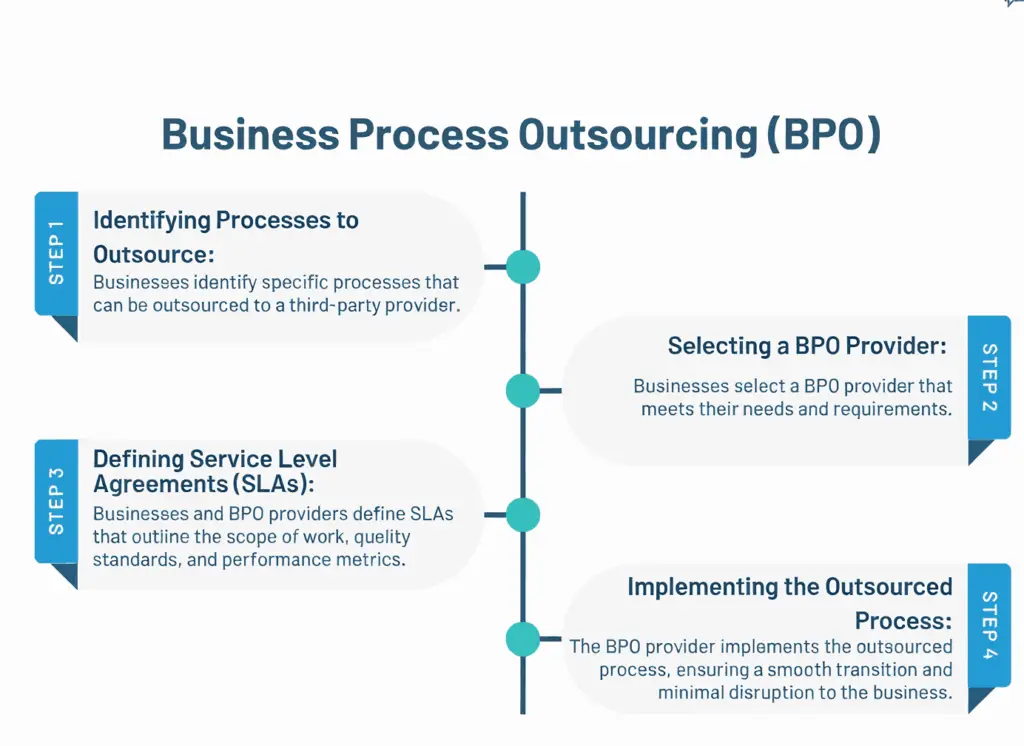
What is BPO? Helpful Guide to Business Process Outsourcing
What is BPO?
In today’s business world, companies are looking for new ways to simplify their operations, reduce costs, and improve efficiency. Many businesses are now using Business Process Outsourcing (BPO) to improve their operations. But what is BPO, exactly? In this post, we’ll learn about the world of BPO, its benefits, and what role can BPO play in business growth?
Understanding BPO: Definition and Meaning
Business Process Outsourcing (BPO), means hiring another company to handle certain tasks or jobs for your business. These processes can include services like customer support and accounting to web development and digital marketing. By outsourcing these tasks companies can focus on what they do best, reduce cost, and free up time for the things that really matter.
BPO services can be broadly categorised into two types:
Front-Office:
Front-office services include customer care functions such as customer support, sales, and telemarketing.
Back-Office:
Back-office services include functions such as accounting, finance, and human resources.
Some common BPO services include:
Customer Support: Providing customer support service through various channels, like phone, email, and chat.
Accounting & Taxation: It includes Managing financial transactions, preparing tax returns, and ensuring that the accounts should comply with the financial regulations.
Web & App Development: Website Designing, developing, and maintaining websites and mobile applications to improve user experience.
Digital Marketing: It includes Creating and managing online Platforms and advertisement campaigns to reach target audiences.
Virtual Assistant: Providing administrative support to business, such as email management, calendar organization, and data entry.
Sales: Finding new customers, making sales, and keeping the process running smoothly.
Benefits of BPO
Why do companies outsource? There are many good reasons. Outsourcing can help businesses in several ways:
- Cost Savings: Outsourcing can help businesses reduce labor costs, infrastructure costs, and training costs.
- Increased Efficiency: BPO companies are experts in what they do, so they can get things done faster and better.
- Improved Quality: BPO providers often have quality control measures in place to ensure high-quality output.
- Scalability: BPO companies can adjust to your business needs – they can handle more work when you’re busy and less when you’re not.
- Access to Expertise: BPO providers often have specialized expertise and knowledge that can be leveraged to improve business processes.
How BPO Works?
The BPO process typically involves the following steps:

Industries that Benefits from BPO
BPO services can benefit a wide range of industries, including:
- Finance & Banking: By Outsourcing accounting, finance, and customer support functions financial institutions can reduce their costs and improve their efficiency.
- Healthcare: BPO provider companies can help healthcare organizations manage their administrative tasks, such as billing and claims processing.
- E-commerce: BPO providers can help e-commerce businesses manage their customer support, order processing, and logistics.
- Technology: BPO providers can help technology companies manage their software development, testing it, and maintenance it.
Conclusion
In conclusion, Business Process Outsourcing (BPO) helps businesses run better, save money, and focus on what they do best. It’s a smart way to outsource tasks and reach your goals.
